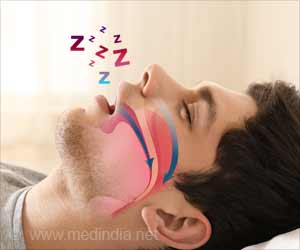“An accurate model that takes into account the different causes of sleep apnea to match therapy to each person should produce much better results from a dental appliance, particularly when CPAP of other treatment isn’t appropriate or preferred,” says lead author of the study, Flinders University Professor Danny Eckert, an honorary Principal Research Scientist at Neuroscience Research Australia (NeuRA).
A major clinical challenge with dental appliances or other therapies is the inability to accurately predict who will respond to it. To overcome this problem researchers have outlined the approach in a new study published in the Journal of Clinical Sleep Medicine.
The research team studied the new technique in 62 people (men and women aged 29-71) who completed standard overnight sleep studies before and after treatment.
The sleep study data, plus the age and body mass index of participants were used in a machine learning-based model to predict the treatment response of the dental appliance to reduce the severity of sleep apnea.
Depending on the clinical definition of treatment success used, the modeling successfully predicted the treatment outcome in about 60%-100% of cases – a very promising sign, which recommends further evaluation in larger clinical datasets.
Source: Medindia



